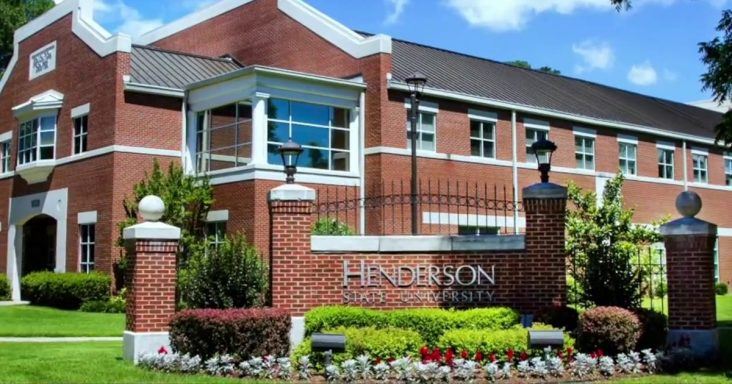Governor, state education department commit to Henderson State University
by July 7, 2022 12:20 pm 3,338 views

Henderson State University in Arkadelphia has been in financial turmoil for the past few years. Still, Gov. Asa Hutchinson, Arkansas Education Secretary Johnny Key and others emphasized Thursday (July 7) that the institution will remain open.
Changes are on the way, Henderson State University Chancellor Charles Ambrose said. School and state officials did not reveal specifics during a news conference in Little Rock, but Ambrose said part of the university’s financial struggles have stemmed from students enrolling in programs and then not completing a degree often due to the cost.
The school had to ask for a $6 million loan from Arkansas’ Budget Stabilization Trust Fund in 2019 to cover unpaid student accounts. The situation spiraled as the COVID-19 pandemic decimated many colleges and universities around the country.
Henderson State’s former president Glen Jones resigned in July 2019 amid the financial troubles, and the school later voted to become a member of the Arkansas State University System. Ambrose was hired in late 2021 to tackle the problem.
Ambrose admitted that the past seven months have been tough for the university and the surrounding community. In May, the school started a plan to save $5 million and slashed faculty teaching positions and salaries.
The plan reduced 88 positions, including 21 unfilled positions or 37% of the 237 total positions in spring 2022. Of the remaining 67 positions cut, 44 are tenured faculty members who may remain employed through the 2022-2023 academic year. The changes will result in annual salary savings of $2.55 million in fiscal year 2023 and an additional $2.79 million in fiscal year 2024.
NEW PATH, NEW CORRIDOR
Ambrose said the reimagining of academic degree programs would be organized into four meta-majors that align with the competencies, skills and talents that design community-based workforce needs: Health, Education, and Social Sustainability; Applied Professional Science and Technology; Business Innovation and Entrepreneurship; and Arts and Humanities.
Academic degrees are designated as either Future Degree Programs, which will continue to be offered, or as Teach-Out Degree Programs. Currently enrolled Henderson students and first-year students in fall 2022 will be supported to complete Teach-Out Degrees. Academic disciplines included in Teach-Out Degrees will continue to be incorporated through the general education and interdisciplinary studies curriculum to enhance outcomes for all students.
“We did not take these decisions lightly, and it is impossible to minimize the impact this has on members of our community,” Ambrose said.
To aid students, the school will enter into unique partnership agreements with other institutions such as Arkansas State University in Jonesboro, ASU Three Rivers, a two-year school in Malvern, and others to expand the school’s academic offerings. In essence, Ambrose said HSU will seek to create an “I-30 learning community from Saline County to Arkadelphia.”
Henderson State has also entered into partnership agreements with the state, Key said. In the coming years, the college landscape will change dramatically, which will give the institution flexibility when crafting its offerings in the future, he said.
Ambrose said his school probably wouldn’t look like any other traditional two- or four-year school in the state, but he thinks it will thrive as it develops a new “educational eco-system” in south Arkansas.
“Henderson State is prepared to take a giant leap forward,” Ambrose said.
There is still a lot to be done to strengthen the school, but Gov. Hutchinson said he thinks Henderson State is on the right path.
“We have the leadership that has worked to right the ship,” he said. “These are tough decisions that have not been easy.”
Ambrose afterwards told Talk Business & Politics that the university is “building the airplane as it flies.” He said that traditional four-year and two-year models are “silos of public education that we put in front of students.” He said students already are finding new learning pathways, but systems often get in the way.
He said that nationally there are too many institutions of higher learning and not enough students. In Arkansas, about 40 institutions are competing for 15,000 students coming out of high school annually, so HSU needs to differentiate itself, he said.
“Really, the competitive skill in the workforce is the ability to learn,” he said. “So really a learning community model says learning’s taking place anywhere and everywhere, right? The problem with education is we don’t necessarily credential it or recognize it in ways that make it easy for students. …
“Skills really aren’t measured by credit hours or semesters. It’s competencies. Do you know it? Can you do it? But it’s also, and college still has that value prop[osition] of, do you do it thoughtfully with expression? Do you have a sense of otherness? Right, so there’s still a place for college, but college needs to be available to all.”
Editor’s note: Talk Business & Politics Steve Brawner contributed to this article.
